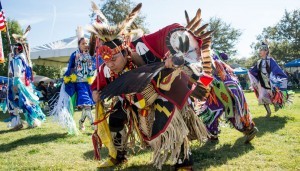CSUN’s Annual Powwow Celebrates America’s Indigenous Culture
California State University, Northridge invites the public to attend the American Indian Student Association’s (AISA) 34th annual Powwow — an American Indian social gathering where dances and songs are shared — on Saturday, Nov. 25.
The free event will take place from 11 a.m. to 9 p.m. on the lawn in front of the Chicano House on N. University Drive, located at 18111 Nordhoff St. in Northridge.

American Indian dancers in a wide array of colorful clothing celebrate native culture at the CSUN 31st annual Powwow in 2014. Photo by Lee Choo.
“The event is a powerful piece of knowledge for the broader community to experience firsthand; not just in a classroom or a book, but to physically experience the vibrancy of these traditions and ways of life that are continuing,” said Brian Burkhart, director of the American Indian Studies Program (AISP).
The history of powwows is as complex as it is ancient. The American Indian’s resilience and passion to spread their culture around the world defeated the laws that were enacted to minimize their existence.
In the 1800s, powwows were banned by federal law. The culture and religion of American Indians was outlawed because they were not considered United States citizens and were denied protection under the First Amendment of the United States Constitution, which guarantees citizens with the freedom of religion, speech and expression. Under these legal threats on their reservations, many American Indians joined Wild West shows where they channeled their culture and traditions into commercial entertainment and traveled the world to share their culture without being jailed.
“These [performances] created the context of intertribal events that would occur,” said Burkhart. “Many tribes came together and shared their dances, and also performed for an audience. This gave them the ability to do it because it was illegal otherwise.”
It wasn’t until 1978 that congress passed the American Indian Religious Freedom Act, to protect and preserve the traditional religious rights and cultural practices of Native Americans, Hawaiians, Eskimos and Aleuts.
Although CSUN’s College of Humanities developed the AISP in 1972 and the AISA continues to be active on campus, many people are still unaware of their existence, said Burkhart.
“Having this public event raises awareness,” said Burkhart. “We are still here. Native cultures are still here. Our ceremonies, dances, traditions, languages and this way of life is continuing strong.”
The powwow will feature intertribal songs and dances with dancers who will wear different regalia, such as, northern, southern, traditional, grass, jingle, fancy and fancy shawl. The community can participate in selected dances.
“The American Indian Student Association students put the event on,” said Burkhart. “It gives them an opportunity to publicly express their identity and who they are. This [powwow] gives encouragement and confidence to students, in terms of grounding their identity and their ability to be successful [in] their life.”
AISP promotes an understanding of American Indian history, cultures and tribal sovereignty with a focus on southern California tribes, and other indigenous peoples in a global context. The program seeks to revise Western knowledge of the history and culture of the U.S. to include American Indian perspectives, contributions, and contemporary political, economic, and social issues in the U.S. and throughout the globe.
For more information, contact the AISP at csunaisa@gmail.com or call (818) 677-5030.

 experience
experience